“Make the Most of Everything”: A blog by Eve
Eve McDonald is studying Arabic and Spanish, but undertook a Summer School in Padua this summer to learn Italian alongside other cultural modules. Here is her blog on how she enjoyed the experience.
It was Monday 1st July 2023, and I was walking to the first lecture with the usual questions that run around your head before you start a new course: “Will I make friends with the other students? Will I like the classes?” but most importantly “Will I even find the students and the classroom?”. I looked up from Google Maps when I reached the end of the blue dot, meaning I must be there, and I realised that I was actually in quite a beautiful building. “This can’t be it”, I thought to myself, but congregating in the corner was a group of people who you wouldn’t really put together normally, speaking in a variety of languages and accents and all looking slightly lost… I had definitely found the summer school.

During the welcome talk my initial nerves were immediately settled after meeting all the lovely lecturers and staff and seeing how much effort they had put into organising the programme. We all walked across the city to Caffé Pedrocchi for an opening ceremony and I knew the name rang a bell. I’m an avid fan of CultureTrip, it’s my go-to app when I find out that I’ll be going to a new city, and I realised this name had been on a list of “Top 10 Cafés in Padua”. It was indeed a very impressive building and a lovely setting to get to know my new classmates in. Although, I did feel a bit out of place when I learnt that the café had been a meeting point for intellectuals and writers such a Lord Byron and Stendhal, who even wrote in his book La Chartreuse de Parme that, “It was in Padua that I began to see life the Venetian way, with ladies sitting in cafes. The excellent restaurateur Pedrocchi, the best in Italy.” I’m sure he would have been delighted to know that I too was struck with this inspiration whilst café hopping in Padua and that I’m now channelling it into my blog for the Global Office, which I have no doubt will leave a similar legacy in the world of literature.
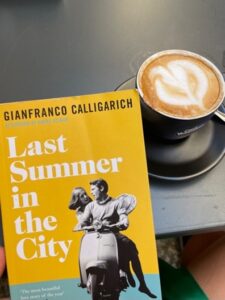
If my year abroad has taught me anything, it’s that “fake it till you make it” is a great motto to live by. It’s highly likely that you’ll find yourself feeling a bit out of place at times, but you just have to act like you’re supposed to be there because the truth is, you are! If the opportunity has been presented to you then it means you’re ready for it and you must make the most of everything that comes your way. I tried to apply this outlook to my classes too. We had language classes three days a week for three hours at a time. This was the first summer that Padova was running the programme, and so there was a relatively small number of students, and only two language groups. When I arrived at my class, it was apparent that my Spanish knowledge had worked in my favour on the placement test; it had maybe even worked a bit too well. I’d been placed in a class with students who had already been studying Italian between one to three years. I did have the opportunity to move to the other class if I wished, but I decided to stay (you know, fake it till you make it and everything) and I’m so glad that I did. The teaching style was a bit different to the way languages are generally taught in the UK since the teacher only used the target language, even to explain grammar points, and we were encouraged to speak in Italian from the first day. I can’t deny that I did sometimes want the ground to swallow me up when I was forced to go outside and interview Italian students even though I could barely string a sentence together. Yet, I will say it’s the quickest I’ve ever been able to have a conversation when learning a new language and the teaching methods did work, even if they were hard to get used to.
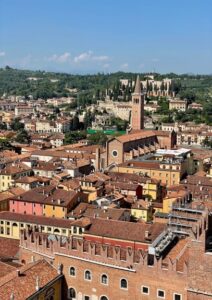
The classes were held in one of the main university buildings and so when we went outside for our break, it was nice to be in an area full of students. All the Italian students who were still there in July were either preparing for exams and their thesis defence or they were graduating. So, people weren’t necessarily available to chat to new students, but it was still nice to be surrounded by other students and we were able to observe some of the entertaining Italian graduation traditions. We always went to the same café during our break and by the end of our stay, the staff knew our order of espresso and cornetto al pistacchio (which I highly recommend). We only stayed in Padua for a month, but it was the little interactions like this that showed me that it’s still long enough to form connections. In fact, I’d say it’s the perfect amount of time. It’s great for experienced travellers who really want to feel like they’re living somewhere and not just on holiday. Yet, it’s also short enough for people who maybe want to use the summer programmes as a “trial” before applying to study abroad. After being sufficiently caffeinated and starting to feel the benefits of a crema al pistacchio-induced-sugar rush, we’d return for the second half of language class; then it was lunch break before we knew it.
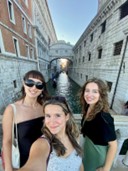
We had quite long lunch breaks, over two hours, which meant the days were very long, since we also had lectures in the afternoon. The lunch breaks worked out well though, because those who wanted to go back to the student accommodation to cook lunch themselves and have a nap certainly had enough time to do that. Those crazy people who wanted to stay out all day also had time to eat lunch out then go shopping, sightseeing, or relax in the park before the lectures started. The lectures were very diverse indeed, covering topics from art history and medieval history to the history of medicine and even the history of fascism! I would be lying if I said that I didn’t sometimes find myself thinking “It’s nearly 40 degrees outside and it’s the middle of July, why am I sat with a group of strangers learning about 11th century Italian communes when I can’t even speak Italian?”. Yet as I’ve mentioned, these “What am I doing here moments?” are completely normal whilst travelling and studying abroad. Those strangers soon became friends and my “Non parlo l’italiano” gradually changed to “Parlo un po’ di italiano”. Unfortunately, I can’t say that I noticed any particular change in my feelings towards 11th century Italian communes, but I did discover a new interest in the history of fascist architecture.
After a long day of class, we’d leave the lecture at about 6pm, just in time to enjoy an aperitivo on the walk back to the accommodation and, in the home of Aperol, it would be rude not to. If you’re a people-watching enthusiast like me, it’s a great opportunity to sit back and watch the streets start to fill with people as the afternoon heat begins to cool down a bit. And it goes without saying that it’s the perfect chance to chat and put your newfound Italian skills into practice. People will typically have their evening meal around 9pm and not go out until much later than we are used to in Scotland. For a fairly quiet city, Padua had plenty to offer when it came to nightlife.
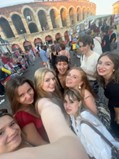
There was Pride Village (a temporary LGBTQ+ friendly club in a giant warehouse that looked like an airport that had been abandoned half-way through the build), Il Chiosco (an open-air club that had a Christmas themed night in the middle of July) and of course, Naviglio (a line of temporary bars along the canal). Naviglio was very close to a lot of the student accommodation and so we spent many nights there. We tried to discern some kind of timetable, but it was impossible since it seemed that every night was completely different. For example, in one particular week I remember a techno night on a Tuesday, a ‘Dad Night’ on a Wednesday (think bands doing cover of Now That’s What I Call Dad Rock) and then a Reggaeton-Zumba night on a Thursday lead by Alex Loco and his trusty sidekick Bruno Brazil. They do say variety is the spice of life and, whilst I can’t promise that Alex Loco and Bruno Brazil will make a return if you apply to the summer programme next year, I can safely say that Paduan nightlife won’t disappoint.
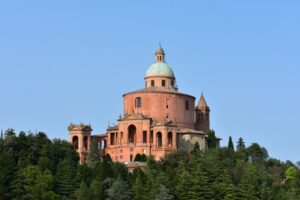
Fear not if going-out isn’t your thing! There were lots of cultural, literary and musical events taking place in Padova over July, such as events with Arcella Bella or at Parco della Musica. Padua also isn’t short of great historical buildings to visit such as the Basilica of St Anthony and the Scrovegni Chapel, although we did visit most of the points of interest in Padua during organised visits as part of the programme. Not only did we visit sites within Padua, but we also went to Venice and Trieste with the summer school. Venice is close enough (just 30 minutes by train) that you could visit alone after class, as we had one day a week without afternoon lectures. I also travelled alone or with my friends to other main cities on the weekend, given that Padua is situated just an hour by train from both Verona and Bologna. I had classmates who did weekend trips to Florence and Milan and I spent my last weekend in Lake Garda (which is also close enough for a day trip). Bologna was by far my favourite city that I visited. Despite being big, it wasn’t short of winding streets, cool cafés and photography exhibitions to wander in and escape the crowds. If you visit, I highly recommend that you take the tourist train to the San Luca monastery. As I sat with my eyes closed, hair flowing in the wind and the sun on my face, it wasn’t quite the motorino ride I had envisaged when my dad told me, “Don’t be getting on the back of any mopeds! At least not without a helmet on!” but I certainly enjoyed a quiet moment of reflection and realised how happy I was that I applied to the summer school in Padua.